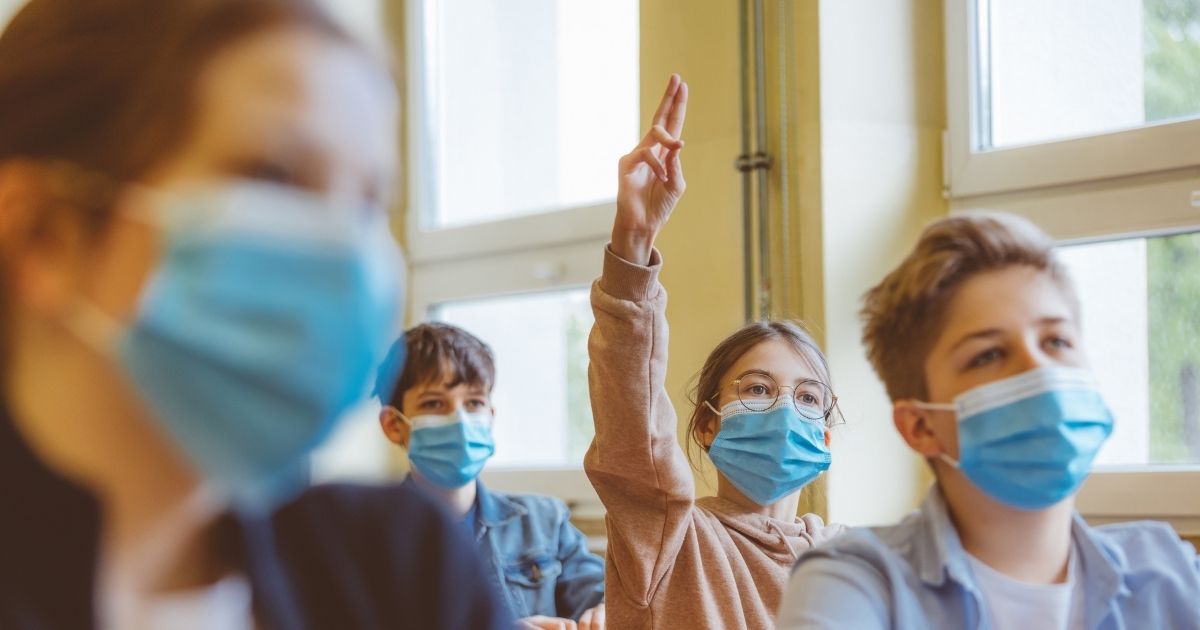
By Eric Marcy, Esq.
Be Aware of Potential Criminal Liability for Violations of Executive Orders
Effective August 9, 2021, Governor Phil Murphy modified existing New Jersey Executive Orders to mandate the use of masks for students, teachers, and staff in schools in what has become Executive Order 251 (EO 251). Although the State legislature and the Governor terminated the Public Health Emergency Order set forth in Executive Order No. 103 of 2020, the legislature preserved the Governor’s authority to implement the recommendations of the Center for Disease Control (CDC) to address, prevent, and limit the transmission of COVID-19 and its variants.
Although particular interest in this topic appears to arise over a disagreement concerning new mask-wearing mandates in New Jersey schools, the legal issues extend far beyond this measure alone.
The broader question becomes: What legal effect do Executive Orders have, and are there penalties for disobeying them?
New Jersey’s Mask Mandate Explained
The New Jersey State legislature reconfirmed the Governor’s authority to implement mitigating and precautionary steps “in specific settings,” including mandating the use of masks in schools to stop the spread of the virus. EO 251 confirms that the mask mandate is necessary due to evidence of the increasing transmission of the Delta variant, and because the “CDC now recommends universal indoor masking for all teachers, staff, students, and visitors in K-12 schools, regardless of vaccination status.”
Strong criticism and political pushback against the school mask mandate has been the subject of recent reporting by major media outlets. It is important to note that EO 251 allows for specific exceptions to the mask mandate and includes an extensive “factual” explanation of the history, basis and need for the mask mandate.
Given the intense debate over the need for the measure itself, the rapidly developing science concerning transmission, and the politicization of the measures that states are taking to control the spread, it is important that business owners and New Jersey residents understand the authority for the implementation of Executive Orders, and the potential consequences of violating them.
Relaxation of the School Mask Mandate is Anticipated to Occur Effective March 7, 2022
On February 7, 2022, Judith M. Persichilli, Commissioner, New Jersey Department of Health issued a press release announcing the Governor Phil Murphy will lift the universal mask mandate effective March 7, 2022 and allow school districts and childcare facilities to continue to implement universal masking policies at their discretion.
Given the uncertainty of the COVID and the Omicron variant, on February 7, 2022, Governor Murphy indicated through his Department of Health Commissioner that he will be signing an Executive Order extending the Public Health Emergency for 30 days.
Due to the uncertainty of COVID and variants we may expect that there may and likely will be further Executive Orders relating mask mandates and other health care measures.
Unfortunately, the rapidly changing facts on the ground create uncertainty as to which Executive Orders are in effect. Although there are criminal penalties associated with violations of mask mandates, to date it is not known if there have been any criminal prosecutions relating to violations of Executive Orders relating to mask mandates. Given the political environment and the rapidly changing positions on mask mandates and other health care measures, it is unlikely that criminal enforcement of any of the Public Health Emergency Executive Orders will occur.
Regardless of the shifting sands of public health emergency orders, the public should be aware of the potential liability existing under our law for the violation of Executive Orders.
Authority to Issue Executive Orders Explained
The Governor of the State of New Jersey has been granted broad authority by the State Legislature to issue Executive Orders in the event of disasters, including public health crises. The authority to implement public health measures is pursuant to the New Jersey Civilian Defense and Disaster Control Act (“Disaster Control Act”) which in the current instance has been invoked in response to the COVID-19 pandemic and continues in light of the continued infections and the onset of the delta variant.
The authority of the Governor to implement Executive Orders is set forth in N.J.S.A. App. A:9-33, in pertinent part, provides:
Appendix A – EMERGENCY AND TEMPORARY ACTS
Section App. A:9-33 – Purpose of civilian defense act and disaster control act
App. A:9-33. Purpose of civilian defense act and disaster control act
The purpose of this act is to provide for the health, safety and welfare of the people of the State of New Jersey and to aid in the prevention of damage to and the destruction of property during any emergency as herein defined by prescribing a course of conduct for the civilian population of this State during such emergency and by centralizing control of all civilian activities having to do with such emergency under the Governor and for that purpose to give to the Governor control over such resources of the State Government and of each and every political subdivision thereof as may be necessary to cope with any condition that shall arise out of such emergency and to invest the Governor with all other power convenient or necessary to effectuate such purpose.
See also N.J.S.A. App. A:9-34 and App. A:9-51 (Emergency Powers of Governor).
Criminal Penalties Possible for Violating Executive Orders
The State Legislature has established criminal penalties for individuals who violate Executive Orders. Violations are tried in the Municipal Court of the municipality where the violation has occurred. These “Disorderly Persons Offenses” impose penalties for a conviction of up to six months in jail and a fine of $1,000.00. N.J.S.A. 2C:43-3.
The authority to enforce Executive Order 251 is set forth in N.J.S.A. App. A:9-49, which, in pertinent part, provides:
App. A:9-49. Violations as disorderly conduct; penalty; prosecution, Any person who shall:
a. Commit any unauthorized or otherwise unlawful act during the threat or imminence of danger in any emergency that jeopardizes the health, welfare and safety of the people; or . . .
h. Violate any order, rule or regulation adopted by the Governor and promulgated as provider by this act; or
i. Violate any other provision of this act declared herein to be unlawful–shall be adjudged a disorderly person and shall be subject to imprisonment for a term not to exceed 6 months or shall pay a fine not to exceed $1,000.00 or to both a fine and imprisonment, in the discretion of the court.
Aiding and abetting a violation of an Executive Order issued pursuant Emergency and Temporary Acts is also a criminal violation pursuant to NJ Rev Stat § App.A:9-50, which, in pertinent part, provides that “Any person who shall knowingly aid or abet another in the violation of any provision of this act shall also be adjudged a disorderly person and punishable in the same manner as the violation aided or abetted.”
Mandating the Use of Mask in School Districts – Recent History
New Jersey Executive Order 251, in pertinent part, provided:
1. All public, private, and parochial preschool programs and elementary and secondary schools, including charter and renaissance schools (collectively “school districts”), must maintain a policy regarding mandatory use of face masks by staff, students, and visitors in the indoor portion of the school district premises, except in the following circumstances:
a. When doing so would inhibit the individual’s health, such as when the individual is exposed to extreme heat indoors;
b. When the individual has trouble breathing, is unconscious, incapacitated, or otherwise unable to remove face masks without assistance;
c. When a student’s documented medical condition or disability, as reflected in an Individualized Education Program or Educational Plan pursuant to Section 504 of the Rehabilitation Act of 1973, precludes use of a face mask;
d. When the individual is under two (2) years of age;
e. When the individual is engaged in activity that cannot physically be performed while wearing a mask, such as eating or drinking, or playing a musical instrument that would be obstructed by a face mask;
f. When the individual is engaged in high-intensity aerobic or anaerobic activity;
g. When a student is participating in high-intensity physical activities during a physical education class in a well-ventilated location and able to maintain a physical distance of six feet from all other individuals; or
h. When wearing a face mask creates an unsafe condition in which to operate equipment or execute a task.
. . .
4. It shall be the duty of every person or entity in this State or doing business in this State and of the members of the governing body and every official, employee, or agent of every political subdivision in this State and of each member of all other governmental bodies, agencies, and authorities in this State of any nature whatsoever, to cooperate fully in all matters concerning this Order, and to cooperate fully with any Administrative Orders issued pursuant to this Order.
5. No municipality, county, or any other agency or political subdivision of this State shall enact or enforce any order, rule, regulation, ordinance, or resolution which will or might in any way conflict with any of the provisions of this Order, or which will or might in any way interfere with or impede its achievement.
6. Penalties for violations of this Order may be imposed under, among other statutes, N.J.S.A. App. A:9-49 and -50.
7. This Order shall take effect on Monday, August 9, 2021 and shall remain in effect until revoked or modified by the Governor.
Simply put, local municipalities, school boards, and any State Agencies are precluded with issuing laws or policies that are contrary to EO 251 and EO 253.
Executive Order 253: Exceptions to the School Mask Mandate
As the impact of COVID variants have emerged and infection rates have increased causing an increase in hospitalizations and deaths, the Governor has continued to issue Executive Orders to address public health concerns. On August 23, 2021, the Governor issued Executive Order 253, addressing vaccine and testing mandates for teachers and covered employees in school districts. This order also clarifies the ambiguity of EO 251 concerning whether or not a parent could assert a claim of medical necessity for a child to be excused from the mask mandate. In pertinent part, EO 253 requires “individuals seeking a medical exemption from mask-wearing under Paragraphs 1(a) – (c) of that Order to produce written documentation from a medical professional to support the exemption. Self-attestations and parental attestations are not sufficient for this purpose.”
Legal Implications for Violating Executive Orders
The legislature has granted the Governor of the State of New Jersey the authority to issue the mask mandate in schools. A violation of Executive Order 251 by “the members of the governing body and every official, employee, or agent of every political subdivision in this State and of each member of all other governmental bodies, agencies, and authorities in this State” potentially exposes the violator to criminal prosecution.
Should an outbreak occur in any school as a result of a violation of Executive Order 251, the District and those individuals in violation and/or “aiding and abetting” may also be subject to potential civil liability in an official and/or personal capacity.
The New Jersey State Legislature has proposed “an Act granting immunity from liability to school districts, nonpublic schools, and employees for claims related to the coronavirus disease 2019” with exceptions for any “school district, nonpublic school, or person causing damage by a willful, wanton, or grossly negligent act of commission or omission.” This proposed legislation introduced on July 20, 2020, is pending with the Assembly Education Committee.
Liability for Violating Executive Orders has Implications beyond Mask Mandates in School Districts
Notwithstanding one’s political position on vaccines, belief as to whether or not masks are effective in preventing the spread of disease, the school mask mandate remains the law of New Jersey until or unless these Executive Orders are terminated or found to be unlawful by a Court. The mask mandate has now been relaxed but the potential for future mask mandates and public safety Executive Orders remain possible.
Unfortunately, if pandemic conditions worsen, new public safety Executive Orders and new reforms may result, restricting or addressing certain workers, services and commercial enterprises. Compliance is required by law and may implicate criminal liability. Business owners should be aware of the potential criminal liability created under the Disaster Control Act for violations of Executive Orders, even those they disagree with and/or impact their ability to operate their business.
Although criminal enforcement statutes of Executive Orders have historically been obscure, they are now the subject of public scrutiny. However, until the Governor and/or the legislature terminates an Executive Order or until the courts determine an Executive Order to be unlawful and unenforceable, such Orders remain the law with potential criminal penalties for violation.
If you are a business owner with a question concerning Executive Orders, please contact Somerville criminal defense lawyer Eric Marcy, Esq. who is Of Counsel to Lyons & Associates, P.C. You can call 908-581-2388 (cell) or 908-575-9777 (office) or you may email him at eric.marcy@lyonspc.com. Our offices are located in Somerville and Morristown, New Jersey, and we proudly serve clients throughout New Jersey, including but not limited to Somerset County, Morris County, Middlesex County, Union County, Essex County, Bergen County, Hunterdon County, Warren County, Sussex County, Passaic County, and Monmouth County
References:
- Governor Murphy Announces That Universal School Mask Mandate Will Be Lifted Effective March 7
- https://www.nj.gov/health/news/2022/approved/20220207d.shtml
- EXECUTIVE ORDER NO. 251, Effective August 9, 2021
- EXECUTIVE ORDER NO. 253, Effective August 23, 2021
- EXECUTIVE ORDER NO. 103, Effective March 9, 2020
- EXECUTIVE ORDER NO. 244, Effective June 4, 2021
- EXECUTIVE ORDER NO. 280, Effective January 11, 2021
- Assembly Bill No. 5820, P.L.2021, c.103, signed into law, June 4, 2021
- N.J.S.A. App. A:9-33 (1953)
- N.J.S.A. App. A:9-34 (1953)
- N.J.S.A. App. A:9-49 (1982)
- N.J.S.A. App. A:9-50 (1982)
- N.J.S.A. App. A:9-51 (1982)
- N.J.S.A. 2C:43-3
- http://njchamber.com – A good source for Economic Recovery and Reopening Updates








